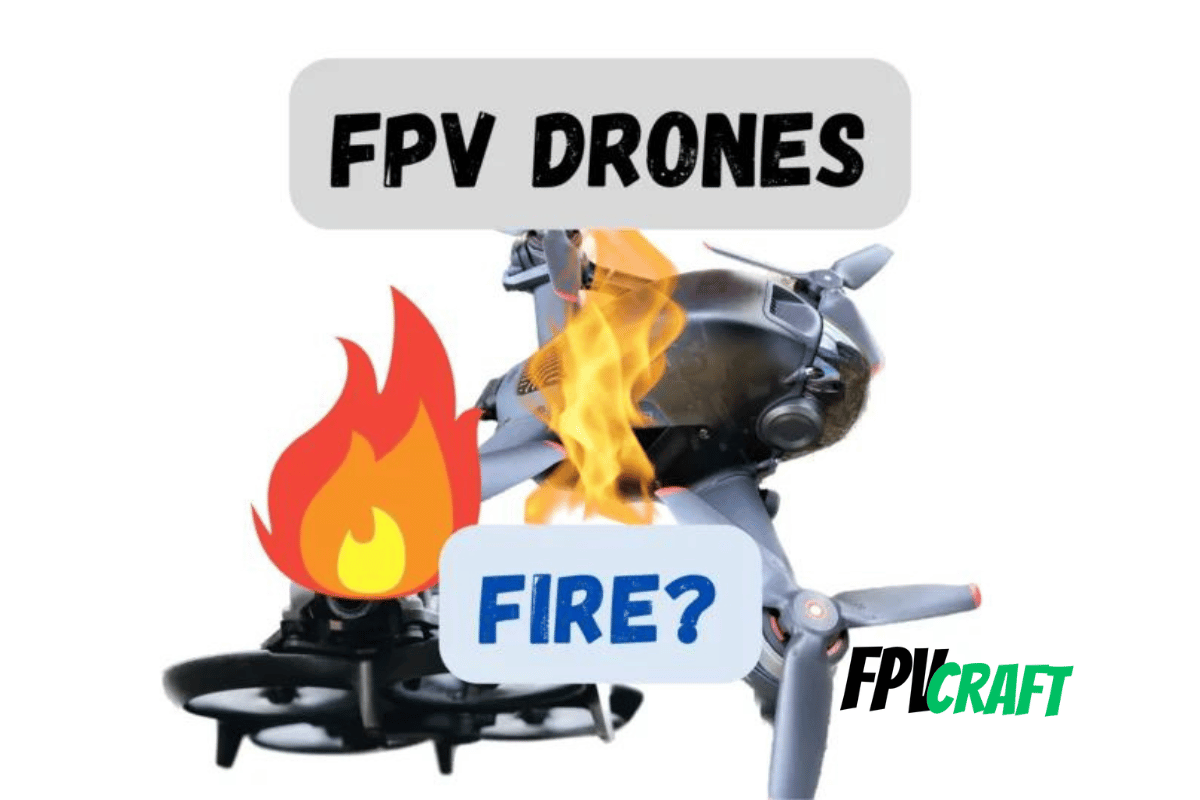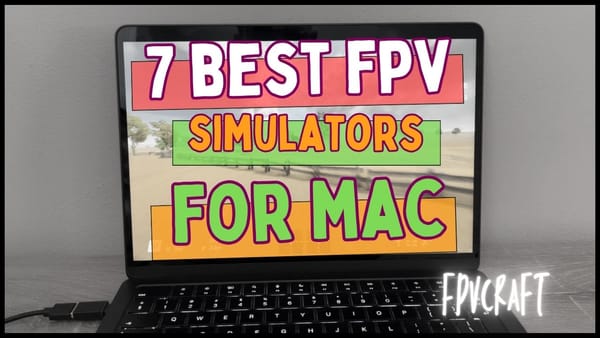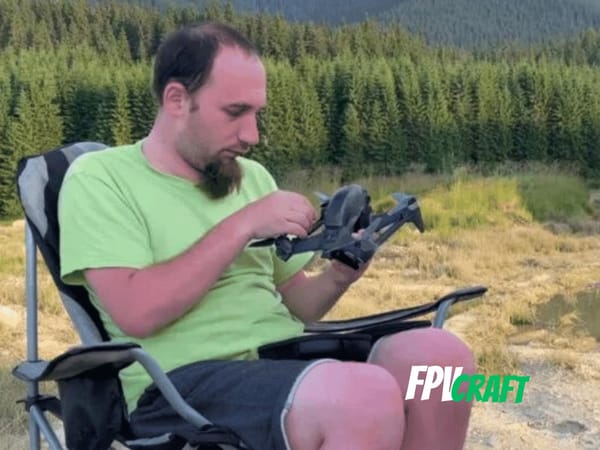Can FPV Drones Start a Fire?
Knowing that FPV drones have pure Lipo batteries with no safety features behind them, can they start a fire? (unintentionally)

We all know the power of custom FPV drones compared to standard GPS drones when flying at high speed and doing quick acrobatic maneuvers. But this may come with several risks when flying an FPV drone. And one of them is by caused fire.
Can FPV drones start a fire?
FPV drones are the most common type of drone that can start a fire, mainly if the battery is damaged in a crash. Flying above dry grass and flammable areas may drastically increase the risk of causing a wildfire.
For the best safety tips and to know more about how an FPV drone can start a fire, we recommend you continue reading.
Fire vs. Drones – what do we know?
To fly a drone, FPV or non-FPV, we need power. And such power can be delivered only by a particular type of Lipo battery with a specific discharge rate. But sometimes, things can go wrong.
It is unlikely for a good Lipo battery to start swallowing and cause a fire, but if you crash your drone and your battery is damaged, then the likelihood increases.
All Lipo batteries can cause a scorching fire if the battery is damaged by impact, not only for drones but also phone batteries or other electronics that function on Lipo.
If you are into drones and FPV drones, maybe you have heard of fires caused by such batteries. That’s why Lipo safety is no joke.
Lipo safety when flying FPV drones
Compared to intelligent batteries found in standard drones, the custom “FPV” Lipo batteries don’t have any safety features. And not to mention, these types of batteries are somewhat unprotected from impact damage.
If you hit a custom Lipo battery and the internal elements are exposed to oxygen, this will quickly come into a combustion reaction and instantly burn a scorching flame.
But generally, it is unlikely for such a battery to cause a fire only by discharging it when you fly an FPV drone.
The more the battery is charged, the higher chance of causing a fire when things go wrong.
Many FPV drones with the Lipo battery underneath the drone are at higher risk of being damaged when landing the drone or flying very close to the ground and crashing it because it is very exposed.
Can FPV Lipo batteries start a fire when charging?
This is the most common way a Lipo battery can start a fire, not when flying the drone but when charging the battery itself.
Suppose you charge at a higher rate than it needs to be charged (C-rate), or the voltage per element is charged at a higher voltage than the maximum recommended voltage. In that case, this comes at the higher risk of the battery becoming a bubble and causing an instant fire.
If you observe the battery being swallowed, please take it away in a safe place outdoors with no flammable elements around because that battery is not only damaged internally, but it may even have enough reaction to start a fire itself.
That battery is very unsafe to use anymore.
It is mainly recommended to be around and always watch when you charge a Lipo battery. Also, charge it in a fireproof bag or metal tin can to ensure the fire won’t expand in the worst-case scenario.
Also, if your custom Lipo battery is dented by impact, it is very unsafe to charge it and use it. It’s time to discharge that battery in a very safe way.
If you want to know more about this risk, please watch the following video from Joshua Bardwell.
FPV Drones vs. standard drones regarding caused fires
A lipo battery from a typical drone is less likely to cause any fire, wherever when flying the drone, if crashing, or when charging.
These batteries are designed with intelligent features behind them, such as limiting the charge and discharge rate, over-voltage and short-circuit protection, overcharge protection, and much more.
Moreover, a standard GPS drone lipo battery is indeed better quality than a standard FPV Lipo battery.
On the other side, it is infrequent to hear that a standard DJI drone may have caused a fire, whereas the ones caused by FPV drones are more common.
Can FPV drones cause a fire while flying?
When flying, it is unlikely for an FPV drone to cause a fire, but it can happen. The leading cause would be if the Lipo battery is already damaged and is being discharged at a higher rate while throttling up the drone motors.
This battery can expand and set the entire drone on fire while crashing.
The likelihood for an FPV drone to ignite dry grass if the battery is intact is very low. The only risk would be for the ESC to smoke out or for extremely hot motors to ignite any inflammable elements.
FPV drones may cause a fire when crashing
This mainly happens if the Lipo battery is on a severe direct impact during a crash.
For instance, when freestyle with your FPV drone and crashing the drone with the battery directly on the concrete or a metal pillar, this can be severely damaged and start a fire.
The fire may affect other drone components, such as the ESC, VTX, etc. But it can be limited depending on the pilot’s reaction to put out the fire and the place the drone crashed.
If the discharge rate is higher than the Lipo battery supports, this is yet another high risk of “burning out” the battery, and may be set on fire.
Each battery has a discharge rate, and the C-Rate is how much current the battery can deliver.
How do we prevent fires resulting from flying an FPV drone?
There are a few safety tips to ensure the safety of Lipo batteries when flying FPV drones:
- Never use a low discharge rate Lipo battery on FPV drones if the discharge rate of the drone is higher.
- Ensure that the Lipo battery is safely placed on the drone and even has some impact protection on the battery.
- Always use the correct voltage battery (e.g., 4s, 6s) on your drone, and don’t put higher than recommended. You can put lower voltage batteries on drones that support higher voltage, but not vice versa. For instance, never use a 6s battery on a 4s drone. This will instantly burn out the ESC and internal components and may cause a fire.
- Do not fly your FPV drone with a damaged battery from an earlier impact, even if this has only a dent. The risks are too elevated.
What to do in case your FPV drone causes a fire?
The first thing for you is not to panic.
Attempt to extinguish the fire but not put yourself in danger. It is always good to have a small portable fire extinguisher with you when flying FPV drones or a bucket with sand if you travel by car.
Throwing water on the burning FPV drone will likely damage other components, but if there are no other solutions to stop the small fire, it is more important to contain it.
If, for some reason, the drone crashed in an area inaccessible and started a fire, or the fire is difficult to contain, it is a reasonable idea to call the emergency services (worst-case scenario)
Please remember that even if a damaged Lipo battery from impact can cause a fire, these fires could be easily contained, in particular, if you have a portable fire extinguisher with you.
» READ MORE: 27 FPV Tips to Know Before Flying FPV Drones
What are the safest FPV drones to fly regarding fire protection?
Let me quickly summarize this: FPV or non-FPV drones, anything with lithium batteries, can burn in flames. But these chances are somehow astronomical.
In regards to FPV drones, the DJI FPV and DJI Avata are two of the safest drones you can fly, with a lot of safety features behind their intelligent batteries that will ultimately minimize the chance of these drones starting a fire.
DJI is known to have built many reliable drones, and the chances are for any of these to catch on fire shallow.
That is why the DJI FPV and DJI Avata have two intelligent (but expensive) batteries. With all these safety features behind them, these batteries cannot be compared by far with custom FPV drones Lipo batteries regarding protection.
Are there any laws or regulations about fires caused by drones?
As far as my knowledge and research, until now, I have found no information regarding laws or regulations across several countries involving fires caused by drones or FPV drones.
It is more likely good to follow the basic guidelines of a fire caused by a Lipo battery, where the FPV drone will indeed classify.
» READ MORE: Does DJI FPV Drone Have RockSteady and HorizonSteady?




